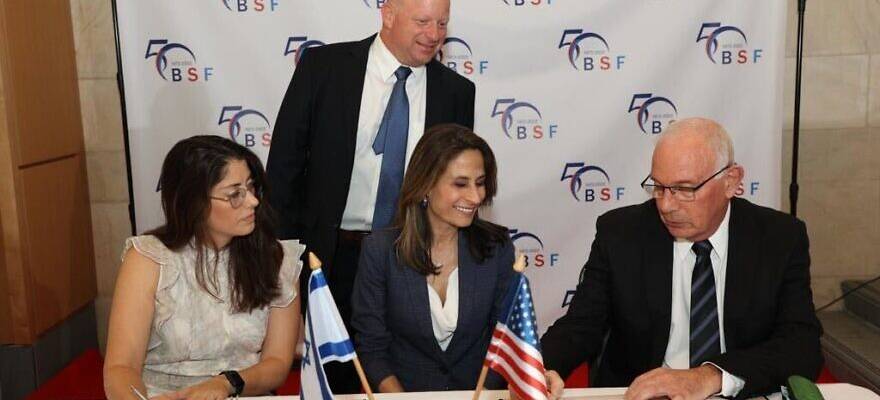The collaborative efforts of the Binational Science Foundation have led to remarkable breakthroughs in many fields.
By Mike Wagenheim, JNS.org
It’s one of the great success stories of the United States-Israel relationship. For 50 years, the countries have collaborated on research through the U.S.-Israel Binational Science Foundation (BSF), resulting in breakthroughs in areas as diverse as robotics, cancer diagnostics, brain defect reversal, space exploration, chemical warfare protection and cancer drug development.
BSF’s celebration at Washington’s National Academy of Sciences last week marked the milestone and included the signing of an agreement for cooperation and joint investment in research in quantum science to develop the next generation of supercomputers.
“The BSF was formed in the early ’70s. And at that time science in Israel was very young and science in Israel was not very developed,” Yair Rotstein, former foundation executive director, told JNS. “In the beginning, BSF used to be the main source of funding for Israeli scientists. Now, the world has changed. And Israeli science is really world-class. The two cooperate more as partners now than when it was the Americans aiding Israeli science.”
The Binational Science Foundation is a grant-awarding institution that promotes collaborative research in a wide range of basic and applied scientific disciplines. Established in 1972 by an agreement between the governments of the United States and Israel, it has distributed more than $1 billion in grants.
In 2021, the foundation awarded 179 collaborative research grants—out of 605 proposals received—for a total of $29.25 million.
Numerous scientists participating in BSF programs have won prestigious awards, including Nobel Prizes, Turing Awards and Fields Medals. Professors Avram Hershko, Aaron Ciechanover and Irwin Rose were awarded the 2004 Nobel Prize in Chemistry for their joint discovery of the ubiquitin system for protein degradation. They were among six out of the eight Nobel Prize laureates in science that year who received at least one BSF grant.
Dr. Peter Hotez, a noted American scientist and BSF board of governors member, told JNS that the government-to-government nature of the project has allowed for more efficient work.
“Scientific collaboration is more complicated in terms of the red tape and the administration that’s involved. And the BSF has helped cut through a lot of that to make international collaboration stronger,” said Hotez. “Science diplomacy is probably the least developed aspect of foreign policy, both in the United States and in Israel. But our research universities and institutes are our most powerful asset in terms of making a difference in the world, and what this partnership does really allows us to capture that.”
Participants on Wednesday also celebrated 10 years of the Binational Science Foundation’s joint funding programs with the U.S. National Science Foundation.
The ceremony was attended by Alondra Nelson, the director of the White House Office of Science and Technology Policy. Orit Farkash-Hacohen, the Israeli minister for innovation, science and technology, spoke at the event.
“My goal is to increase joint research between Israelis and Americans in the coming years, and therefore, among other things, my ministry and the National Security Council are engaged in strengthening technological cooperation between the countries within the framework of the Jerusalem Declaration,” said Farkash-Hacohen, referencing the wide-ranging Joint Declaration on the US-Israel Strategic Partnership signed by President Joe Biden and Prime Minister Yair Lapid during the former’s visit to Israel in July.
As part of Wednesday’s celebration, Israel announced a 20 million shekel (about $6 million) investment in quantum research, with a matching investment expected from the U.S. The research will focus on developing encryption capabilities for fields such as crypto and defensive and offensive cyber capabilities.
